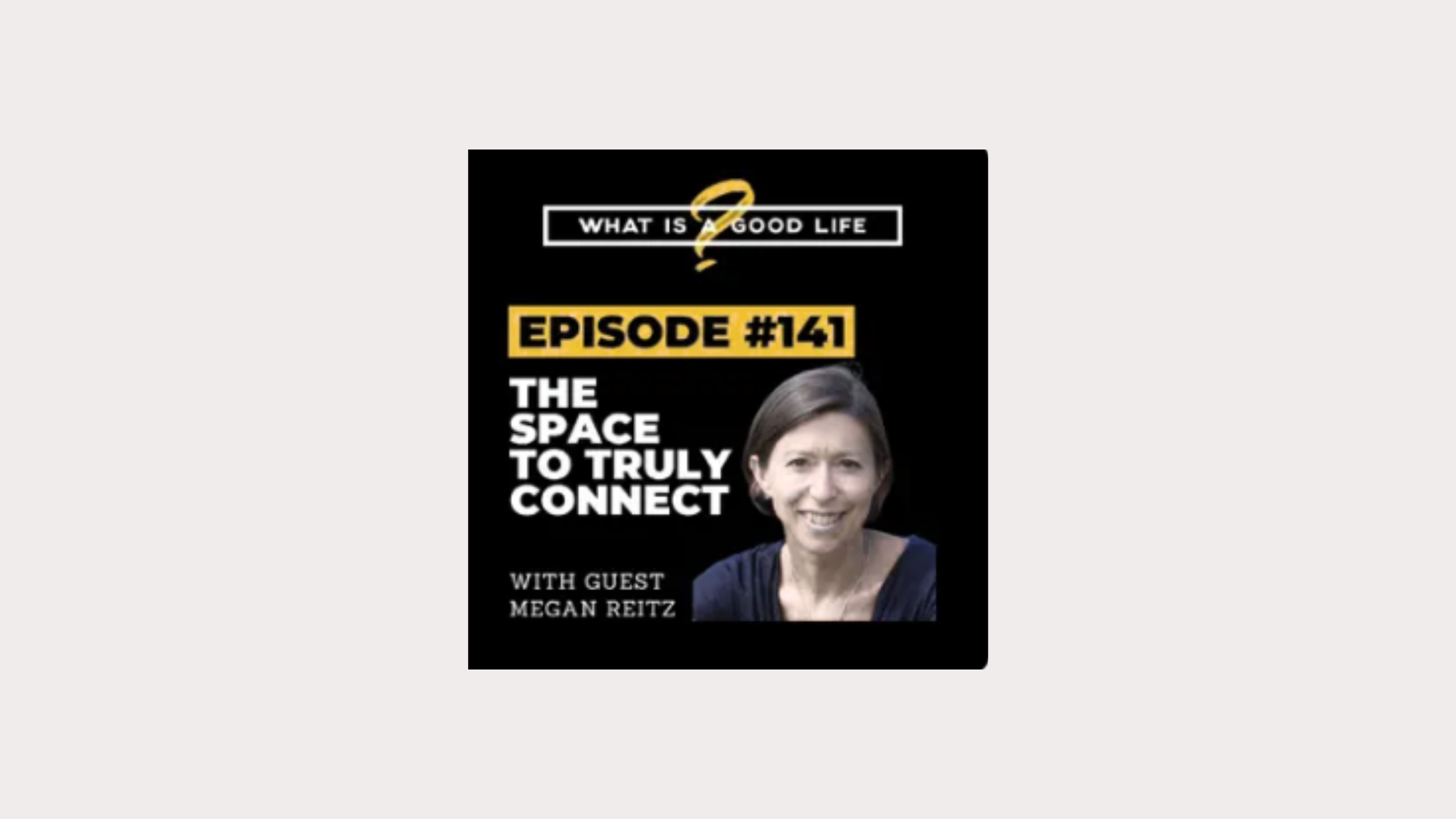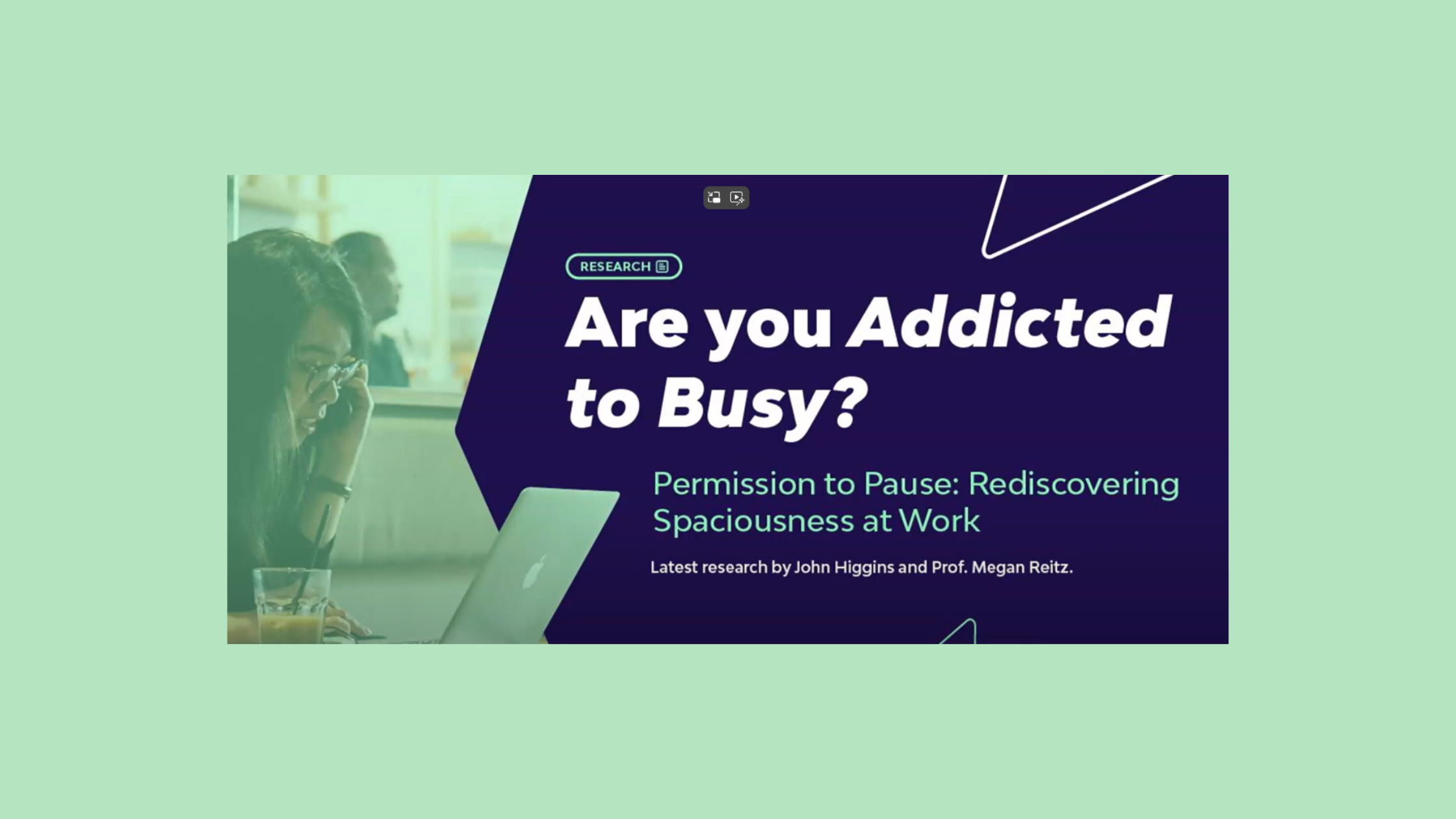What the fear?!
Is there space to think, breathe, or connect in your workday? In this episode, I talk with leadership thinker and mindfulness researcher Megan Reitz about the tension between doing and being – and how fear, power and pressure keep us stuck in overdrive.
Megan is an Associate Fellow at Oxford’s Saïd Business School and co-author of Speak Up and Speak Out, Listen Up. Her latest research explores spaciousness - a different kind of attention that opens up creativity, connection and compassion.
Together we examine how workplace culture often rewards busyness over awareness - and what we lose when we constantly prioritise speed, certainty and performance.
Read More
What is a Good Life? #141 - The Space To Truly Connect with Professor Megan Reitz
On the 141st episode of What is a Good Life?, I’m delighted to welcome Professor Megan Reitz. Megan is an Associate Fellow at Saïd Business School, Oxford University, and Professor of Leadership and Dialogue at Hult International Business School. She is a leading thinker on leadership and dialogue, featured in the Thinkers50 ranking of global business thinkers, and the author of Dialogue in Organizations, Mind Time, and, most recently, Speak Out, Listen Up. Her work explores how we create the conditions for transformative dialogue at work, and her latest research examines how we can foster spaciousness — the capacity to innovate, reflect, and build relationships in workplaces addicted to busyness.
Read More
The Megan Reitz one- Spacious Work
I’ve worked with Megan for years: we ran a brilliant simulation together and that experience was a period of growth and exploration for both of us.
Since then, Megan has written some of the most amazing research and books, with co-authors like Michael Chaskalson and John Higgins, who have both been guests in this series. She is sought after as a speaker, facilitator and consultant, and I admire her greatly.
I am delighted that we had the chance to do this episode before she went off on a summer break. It’s a lovely exploration of her research and writing, its roots and why it all matters so much to her. I do hope you enjoy it as much as I did.
Read More
Making the case for spaciousness with Megan Reitz and John Higgins
‘Busyness’ is increasingly seen as a badge of honour and productivity is regularly measured and rewarded at work. Despite all we now know about workplace stress, anxiety and burnout, we seem to be doing little to address the destructive pace at which we are living our lives. In this episode, Jen, Dom and Cat chat with Megan Reitz and John Higgins about their latest research, on the topic of spaciousness and how to find it.
Read More
The Best Leaders Encourage "Spacious Thinking"
There are two modes of attention that people use at work: doing mode, in which they pay narrow attention to a specific task in order to control, predict and get it done efficiently; and spacious mode, in which they pay attention more expansively, without hurry, making them more receptive to relationships, interdependencies, and possibilities.
Read More
Create Mental Space to Be a Wiser Leader
In our rush to do more, we’ve lost the critical space to think deeply. Leaders may trap themselves and others in “doing mode,” where quick actions overshadows thoughtful reflection - with hefty consequences like poor decisions, burnout, and stifled innovation. The SPACE framework (safety, people, attention, conflict, and environment) can help you enter the “spacious mode” – a different way of paying attention that enables better collaboration and wiser choices.
Read More
Addiction to busy webinar with Megan Reitz & John Higgins
Professor Megan Reitz and John Higgins as they share their latest research on a pressing issue: our addiction to busyness. Discover: 🏃How being stuck in “doing” mode can blind us to critical challenges and opportunities, while also damaging key relationships squeezing out the spaces for quality conversations of all types. 📖 Their research on why shifting from a relentless “doing mode” to embracing “spacious mode” is essential for effective leadership and cultivating meaningful workplace relationships. 🎯 Practical strategies to integrate “Spacious Mode” with our everyday “Doing Mode,” enabling you to move beyond mere busyness and cultivate a thriving, flourishing work environment.
Read More
The Power of Spaciousness and the Gift of Being Seen
Do you feel like a rubber band about to snap- low on capacity, time, and space to think? Are you constantly stuck in a mode of “doing” - trapped by your own productivity? Researcher and author Megan Reitz says that shifting into “spacious mode” could do wonders for your mental health, your relationships, and your work. She speaks with Morra about how our obsession with productivity might be crowding out creativity, insight, and connection. Plus, she’ll share practical ways to slow down, get present, and pay attention.
Read More
Culture & Compliance Chronicles: Organizational Growth Through Fostering Speaking Out and Listening Up with Megan Reitz
On this episode of Culture & Compliance Chronicles, Nitish Upadhyaya from Ropes & Gray’s Insights Lab and Richard Bistrong of Front-Line Anti-Bribery, are joined by Megan Reitz, founder of Reitz Consulting and an Associate Fellow at Saïd Business School, Oxford University. Megan, a renowned thought leader listed on the Thinkers50 ranking and HR Magazine’s Most Influential list, shares insights from her latest co-authored book, Speak Out, Listen Up: How to Have Conversations That Matter.
Read More
How to Give Yourself More Space to Think
Professionals today are focused on doing mode— achieving goals and checking items off of to-do lists to satisfy their managers and companies. But better relationships, bigger-picture strategic and creative thinking, and personal well-being and satisfaction rely on pausing from doing mode and entering into spacious mode. To do this amidst daily pressures, people should recognize that they first need to give themselves permission to pause, adopt practices to train their minds to be more spacious, build a safe space for pausing around them, and keep the company of those who help them enter spacious mode
Read More
A pause is not just for Christmas
As HR and employees become increasingly obsessed with the 'doing' mode, now might be the time to activate the ‘spacious mode’.
Numerous employees, among them HR professionals, are returning to work this January with new year's resolutions, aiming to redress work/life balance, get less stressed and enjoy life more.
Read More
Spaciousness
Across many areas of life, from education and health through to business and politics, we’ve become obsessed with the ‘doing’ mode. We like to keep busy in a world where success is measured and rewarded through meeting immediate, tangible targets. Pausing, stepping back to reflect on what this busyness is all about, is seen as a sign of laziness or inefficiency. It can also feel terrifying when we’re not used to it – it forces us to engage with who we are when we aren’t busy with our busy doing.
Read More
The Conscious Leaders Podcast
Megan has a long history of working at the cutting edge of leadership development and marks a departure from the usual guest on this podcast.
She is a deep thinker and researcher around how leaders need to behave in what she calls a ‘pathologically busy’ workplace. This interview explores how our society has an over focus on the short-term, the to do list which leads to rampant busyness. This is not the role of a leader who needs to be able to step back and have perspective.
Megan shares how reflective practices and wise attention will help us become the leaders we want to be.
Read More
Minds Worth Meeting
🎙️ On the next episode of Minds Worth Meeting, leadership and dialogue expert Megan Reitz joins us to discuss the importance of how leaders “show up” to work, why we all need safe environments to speak up and permission to pause, how AI is starting to change dialogue in organizations, and more.
Read More
Leading the conversation: Enabling mental health discussion
Mental well-being is critical for individuals, communities, and organizations, yet despite the lifting of taboos around mental health in society, employees are feeling less cared for than ever. So why are we still reluctant to talk openly about our mental well-being at work?
Leaders can play a critical role in facilitating these conversations by speaking up about their own experiences and encouraging others to do the same.
Read More
Phronesis: Practical Wisdom for Leaders with Scott Allen
Dr. Megan Reitz is Associate Fellow at Saïd Business School, Oxford University and Adjunct Professor of Leadership and Dialogue at Hult International Business School. She focuses on how we create the conditions for transformative dialogue at work and her research is at the intersection of leadership, change, dialogue and mindfulness. She is on the Thinkers50 ranking of global business thinkers and is ranked in HR Magazine’s Most Influential Thinkers listing.
Read More
Leaders Speak Up: Unlocking Mental Health in the Workplace
In the last of our special Mind Matters sessions, Megan Reitz, Amy Edmondson, Peter Sims and moderator Morra Aarons Mele discuss the implications of the leader’s optimism bubble, de-stigmatising failure, and building scaffolding to invite input: a culture of speaking up doesn’t create itself, it requires scaffolding. Find out more about productive vulnerability, the role of experiential knowing, and how to make space for the bigger conversations.
Read More
When a Team Member Speaks Up — and It Doesn’t Go Well
Speaking up — and being heard — in organizations is critical, but failed attempts to speak up happen often at work and can lead people to silence themselves and others in the long run. Instead, leaders and team members should frame such situations as opportunities to learn.
Read More
Speaking Truth To Power With Megan Reitz
How can you speak confidently and navigate difficult conversations in your organization? How does power dynamics affect communication? In this episode, Megan Reitz, the author of Speak Out, Listen Up, talks about how perceptions of power enable and silence others. She also breaks down the TRUTH Framework that affects whether we speak or listen. Delve into the subtle influences that prevent us from voicing our most innovative ideas. Join Megan Reitz in this valuable conversation today.
Read More
How better (not smoother) conversations can deliver at work with Megan Reitz & John Higgins
Megan and John discussed the idea of ‘psychological safety’ and how better (not smoother) conversations can be delivered at work. They provided guidance on navigating power dynamics, empowering you to speak up confidently and ensure your voice is heard. They also discussed how to leverage your influence and encourage others to express themselves.
Read More




















